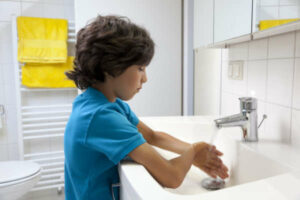When it comes to OCD treatment for children, there are a lot of myths and misconceptions floating around. Some people think that therapy is the only effective treatment. While others believe that medication is the only way to go. In this blog post, we will take a look at the different types of childhood OCD treatments available and discuss which ones work best.
Contents
What Is Childhood OCD?
 Childhood OCD is an anxiety disorder that typically begins in early childhood and can last into adulthood. It’s characterized by obsessions — frequent, intrusive thoughts or worries — as well as compulsions — repetitive behaviors performed to reduce the anxiety caused by the obsessions.
Childhood OCD is an anxiety disorder that typically begins in early childhood and can last into adulthood. It’s characterized by obsessions — frequent, intrusive thoughts or worries — as well as compulsions — repetitive behaviors performed to reduce the anxiety caused by the obsessions.
Kids with OCD often have difficulty concentrating and focusing on school work, forming relationships with peers, and engaging in healthy social activities. They may also experience physical symptoms like headaches or stomachaches.
Common obsessions for children with OCD include:
- worries about safety
- contamination
- orderliness
- doubts about their thoughts or actions
- fears of making mistakes
Common compulsions include:
- hand washing
- counting and checking behaviors
- repetitive questioning
- hoarding or collecting items
- ritualistic behavior or routines
When OCD is left untreated, it can lead to academic and social problems. So, do not hesitate to seek help if you notice signs of childhood OCD in your child. Early intervention and treatment are essential for managing the condition, reducing anxiety, and helping children cope with their symptoms.
What Are Some Childhood OCD Treatment Options?
 It is important to note that OCD in children can be managed by a variety of treatments. Some common childhood OCD treatments might include:
It is important to note that OCD in children can be managed by a variety of treatments. Some common childhood OCD treatments might include:
Cognitive Behavioral Therapy (CBT)
This type of therapy helps children learn how to identify and challenge their obsessive thoughts as well as manage their anxiety. It helps them develop better-coping skills and teaches them how to control or lessen their OCD symptoms. CBT works to help children recognize their maladaptive patterns of thinking and behavior, and then develop more positive ways to cope with stress.
Exposure Response Prevention (ERP)
ERP is often used in combination with CBT for OCD. This type of therapy involves exposing children to their fears and then helping them learn how to resist engaging in rituals or avoidance behaviors. By facing their fears, children learn how to manage their anxiety without resorting to compulsive behavior. However, this might be difficult for some children, so it should be done gradually and with support.
Family Therapy
Family therapy can help parents and siblings understand OCD better. It also helps the family members learn how to support their child’s recovery. And it can help family members learn how to recognize any negative patterns of behavior and how to respond in a more positive way. In fact, family-based therapies can help the entire family to better support the child and their recovery.
Antibiotics
This type of treatment is not typically used to treat OCD. However, some research suggests that certain antibiotics may be effective in reducing some symptoms of OCD. It is important to note that this type of treatment should only be considered after other treatments have been tried and failed.
Healthy Lifestyle
Children usually respond well to lifestyle changes. These might include engaging in regular exercise, eating a healthy diet, and getting enough sleep. It is also important to have structure and routine in their lives, as this can help reduce anxiety levels. In fact, it is believed that healthy lifestyle changes can help reduce the severity of OCD symptoms.
Mindfulness
Many children benefit from mindfulness techniques, such as deep breathing and meditation. This type of therapy helps children learn how to focus on the present moment and be aware of their thoughts and emotions without judging them. Mindfulness can help children gain better control over their OCD symptoms, as well as reduce their overall levels of stress and anxiety.
Herbal Supplements
Parents want to make sure their children get the best treatment for OCD. Some parents may be interested in exploring herbal supplements as an alternative treatment option. However, it is important to note that there is very little scientific evidence to support the use of herbal supplements for OCD. It is always recommended to speak with a doctor before giving any type of supplement or medication to a child.
Support Groups
Finally, many children benefit from the support and guidance of support groups. Finding a group of people who understand what your child is going through can be very helpful. Many parents find that their child is able to connect with other children in the same situation, which can provide emotional and social support. Support groups offer an opportunity for children to share their experiences, and learn how to manage their OCD symptoms. And gain confidence in their ability to cope with the disorder.
These are some basic and highly effective treatments for OCD in children. It is important to speak with a doctor or mental health professional about the best treatment options for your child’s particular needs. With the right treatment and support, your child can learn how to manage their OCD symptoms and live a happy, healthy life.
Do Kids With OCD Need Medication?
 Usually, if the kids have moderate to severe OCD, medication is needed in order to help them cope and manage their symptoms. The children OCD treatment is tailored to the individual child and family. Most treatment plans involve a combination of cognitive behavioral therapy (CBT) and medication if needed.
Usually, if the kids have moderate to severe OCD, medication is needed in order to help them cope and manage their symptoms. The children OCD treatment is tailored to the individual child and family. Most treatment plans involve a combination of cognitive behavioral therapy (CBT) and medication if needed.
Depending on the severity of symptoms, your child’s doctor may recommend specific medications such as selective serotonin reuptake inhibitors (SSRIs). These medications have been approved by the Food and Drug Administration (FDA) to treat OCD in children 9 years and older.
They work by blocking the reabsorption (reuptake) of serotonin, a brain chemical that plays an important role in how you think and feel. In doing so, these drugs can help reduce the obsessions and compulsions associated with OCD.
Generally, these medications are well-tolerated and have few side effects. Common side effects may include nausea, insomnia, headache, drowsiness, or jitteriness. Other potential risks can include thoughts of suicide in some children who take SSRIs. It is important to discuss these risks with your child’s doctor before deciding on medication for treatment.
Can A Child With OCD Live A Normal Life?
Yes, a child with OCD can live a normal life. Though it is important to remember that OCD is a chronic and often lifelong disorder, there are numerous treatment options available. That can help children with OCD manage their symptoms and lead an active, healthy life.
In addition, there are a few factors that you should consider before making a decision to start treatment for your child with OCD. These include:
- The severity of OCD: It is important to keep in mind that the severity of OCD can vary from person to person, so it is important to assess the level of distress your child is experiencing and its impact on their life.
- The type of treatment: Depending on the severity of OCD, you should consult with a medical professional to determine what type of treatment plan would be most beneficial for your child. This could include cognitive behavioral therapy (CBT), medication, and/or exposure and response prevention (ERP).
- The support system: It is important to have a strong social network in place so that your child can have someone to talk to when they are feeling overwhelmed. This includes family members, friends, school counselors, and/or therapists.
By being proactive and taking the necessary steps to get your child the support they need, you can help them live a normal life despite their OCD diagnosis. With proper treatment and management of symptoms, children with OCD can lead happy, fulfilling lives.
So if you are considering children OCD treatment options, it is important to remember that it is possible for them to live a normal life with the right support and guidance. Don’t hesitate to seek help if you think your child needs it. As early intervention can make a big difference in their long-term outlook.
Conclusion
In a nutshell, children OCD treatment options are available and can be effective in helping children manage their symptoms. Parents should work closely with a qualified mental health professional to determine the best treatment approach based on their child’s individual needs. With proper care, parents and healthcare professionals can help children learn how to cope with OCD and lead happy healthy lives.
Take care, and don’t forget that you are not alone! OCD is a mental health disorder characterized by obsessions and compulsions. If you have any queries regarding OCD treatment, ERP therapy experienced therapists at OCDMantra can help: Book a trial OCD therapy session


